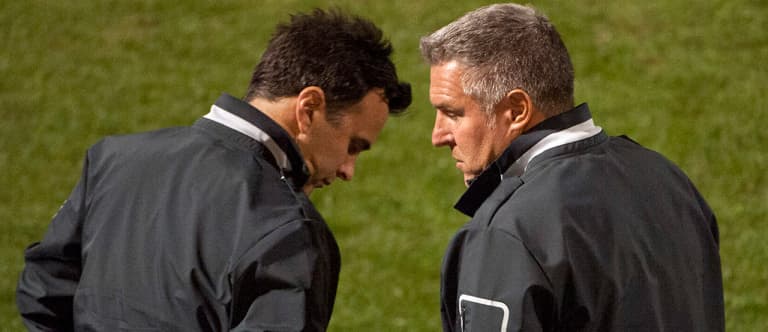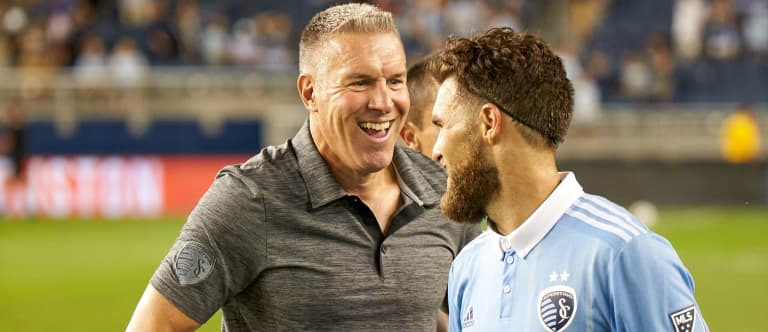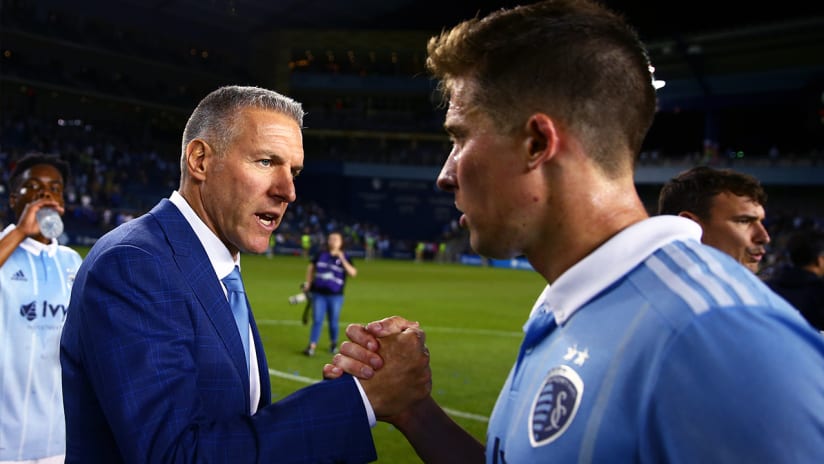KANSAS CITY, Kan. — As Major League Soccer has grown in size over the years, so have the standards and expectations for teams. The ability to establish a consistent, winning culture has been successful in some markets, and a work in progress elsewhere. Some teams have bought their ways to success and others have done their best to develop it. It's something Sporting Kansas City have worked hard to build a blueprint over time, and they shared the process recently.
“When I first took over,” Sporting technical director and manager Peter Vermes told MLSSoccer.com, “most people don’t really realize this, but I basically cut the head off the snake. I basically got rid of all the older players that were here at that time. I went with a lot of younger players.”
Vermes replaced Curt Onalfo as manager of the Kansas City Wizards in August of 2009 but had been with the club as technical director since late-2006. He was initially named the interim manager but decided to continue coaching the team full-time during the ensuing offseason. He described his roster decisions of going young as more of a necessity to create, and institute a culture.
“I needed young, hungry guys that were going to understand that there was going to be a big paradigm shift in the way things are going to be done going forward,” he explained.
To understand where Vermes gained his ideas and penchant for running the club from the top down, you have to travel further back into Kansas City soccer lore, to the 2000 Kansas City Wizards.

Zavagnin (left) and Vermes were teammates with the Wizards before Zavagnin became Vermes' lead assistant in 2009 | USA Today Sports
“I think when we started as teammates in 2000, we always had conversations of if we were in control of the club, how would we organize this, and what are the things we would do to improve the environment and improve the culture,” Sporting KC assistant coach Kerry Zavagnin, told MLSSoccer.com.
Vermes gravitated towards the idea of building it all around a dual culture, one that prioritized the team above all, and one that expected winning. In trying to get his message across, he said he had to play the role of salesman.
“The first thing I had to be was a salesman, and I had to sell them on why,” said Vermes. “And then I had to start demonstrating situations where, ‘Hey, that’s not a team first moment.’ Or, ‘Hey, that’s not working hard, that’s not very intelligent on the field, that’s not a winning mentality.’ So, then what you do is start providing examples of, ‘Hey, this is a team-first mentality. Watch this action.’ Because video is a powerful thing, seeing something on the field is a powerful thing. So, we were able to reinforce those aspects.”
According to Vermes, Sporting KC’s “Core Four Values” are:
- The team is always first
- High work ethic
- Be intelligent
- Pursue excellence daily
For players, it even felt stripped down to a basic level of understanding of how to go about your daily business, the kind of process that made legendary UCLA basketball coach John Wooden famous.
“At the beginning I can very specifically remember him when he took over, that he really didn’t care about getting wins initially.” said defender Graham Zusi, who has spent his entire pro career, 10 seasons, in Kansas City.
“We were changing the culture of really just how we trained in the beginning. Ultimately that grew into what it took to win as a team and as a group. But from the minute he took over, it was more about getting everyone’s mindset right about getting that team first mentality from the get go.”
Soon though, those expectations became a reality for players. They got their first taste of glory when they won the U.S. Open Cup in 2012, enjoying a truly breakout season. According to Sporting KC captain Matt Besler, another 10-season veteran of the club, that’s when the expectation to win got real.
“I think every team in the league has an expectation to win,” said Besler. “But until you actually do it, they’re not real. That’s the main difference. Before it’s ‘We expected to win.’ To win a trophy in Champions League, Open Cup, all those different things, until you know what that feels like, and you know what it takes, it’s just talk.”
The culture that Sporting KC have worked to create over the last decade and more has helped breed success from the top down. Sporting’s academy has made great strides, as young teenage academy products in Gianluca Busio, Jaylin Lindsey, and Wan Kuzain Wan Kamal, have put in a total close to 1,000 minutes for the first team this year.
While they’ve put work into the academy, Vermes feels there is still plenty of room for improvement when it comes to talent I.D. in their own backyard. Of those three that have played for the first team this season, none of them are actually natives of the Kansas City area, as Busio and Lindsey are from North Carolina, while Kuzain is from St. Louis.
“We have to constantly bring in high quality players,” Vermes said, “that aren’t kids that we think can make the academy. It’s not players we think can go play for Swope Park Rangers, it’s kids that we think have the ability to make it to the senior team.
"That’s what we’re looking for. We’re not going to find all those kids just in Kansas City. I can tell you that’s the way it is all over the world. So, we have to be flexible, nimble, and good at identifying talent that fits the way that we want to play, and so on.”
And again, while plenty of credit should go to Vermes, his staff, and the players for buying into the culture, the manager credits the ownership group for setting the entire plan in motion and supporting his efforts over the years.
“None of what we do is possible without our ownership group,” Vermes said. “They obviously had a vision when they purchased the team. They also realized that they wanted to do it how they believed it to be right.”
As the culture trickles on down from Vermes and the ownership group, down to the players, their hope is that it continues to trickle down, to the next generation of Sporting KC and beyond.

Graham Zusi has been one of the key parts of SKC's winning culture | USA Today Sports Images
As the core group of guys that Vermes began with are now into their thirties, with contract extensions in tow, it’s the captain that truly recognizes where they need to pass the baton to the younger generations:
“It’s hard, because when you’re in it, you’re in it,” Besler said. “You never really see it’s the end until it’s the end. That’s a tough perspective to have. But I think the veteran core that we have has been around long enough, and I’d like to think that we’re smart enough to be able to see.
"It’s definitely something that we’re conscious about, and passionate about. It takes work to create a culture. But it can be broken down in an instant. So, you have to protect it, with everything that you have.”













